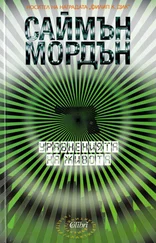It was quiet for a few moments, then he could hear voices approaching. Armstrong was one, and there were others. They seemed anxious.
The phone was picked up again, and an older voice spoke. It was one that was used to both issuing and obeying orders.
“This is Admiral Malcolm Arendt of the United States Navy. Who is this, and how did you access this system?”
“Didn’t Joe say? I had such high hopes for him, too. Or is the problem with you, Admiral? Maybe Joe did say, and you didn’t believe him because you thought my atoms were floating around in the atmosphere somewhere over France.”
A hand muffled the mouthpiece, and the admiral called out to the rest of his audience. “It’s Petrovitch.”
“That’s what I’ve been telling you. Now, you’re not Mackensie either. They’re all in the Situation Room, right? You can patch this call through—I’d do it myself, but why should I do all the work?”
“President Mackensie does not talk to terrorists.”
“Can I remind you who just toppled Nelson’s Column? It’s lying there across Trafalgar Square, and Nelson’s head has come off. That picture is currently running on every news network on the planet. Even your own. If I can stomach talking to Mackensie, he can have the grace to sit his scrawny arse down and talk to me.”
“President Mackensie does not talk to terrorists. I do not talk to terrorists. No one in this administration talks to terrorists.”
“Fine. You don’t want to know how your country dies. I can understand that.”
“I… what?”
“Not only did you not get me, you didn’t get Michael,” said Petrovitch.
“Michael?”
“The AI. It has a name: Michael. That’s who you’ve been trying to kill; the same Michael that the Vatican are about to declare to be alive. Not that you care about that any more than you did when you thought it was just a machine. Sorry, I’ve distracted myself. Me and Michael: between us, we’ve decided that you’re just too dangerous to have around anymore, and the world would be a better place without a bunch of nuclear-armed fundamentalist xenophobic psychopaths. Sorry it had to turn out this way, but hey.”
“You’re threatening to destroy the United States of America. You and whose army?”
“Yeah. The last time someone said that to me, I surprised them by turning up with, you know, a whole army. Prepare for the New Machine Jihad, Admiral.”
“We can deal with the AI, Petrovitch,” said Arendt. “We can deal with you, too. Now get off this line.”
“Just one more thing, Admiral. If you isolate your network now, the virus routines we’ve installed across your country’s infrastructure will no longer be able to talk to Michael. If that happens, they’ll turn off every computer they’re hiding in, and I’m sure you know just how difficult it is to get these things restarted once they go down. You’ll lose everything, for a very long time. You’ll be reduced to the nickels and dimes in your pocket.”
“Anarchy. You’re talking about Anarchy.”
“Modified. So hold off on your kill switch. Of course, you’ll want to check if I’m bluffing: but I did the same thing to the Freezone earlier on today, and if you can find anyone who’ll still talk to you after what you’ve done, they’ll confirm the sudden and total shutdown. I had an AI to help me clear up my mess, though, so I imagine your pain will last an awful lot longer than ours did. Years, probably. How are the NSA doing at clearing up the last outbreak, by the way?”
There seemed to be a lot of people running in the background, running and talking hurriedly over phones. Of course, they were trying to trace him: that exercise was doomed to failure, but he’d have been disappointed if they hadn’t tried. Some of the conversations were about activating assets within the Metrozone: again, the likelihood he’d accounted for every CIA agent didn’t come with a cast-iron guarantee.
Some of the discussions were more technical—how he had hijacked the satellites involved and how they could take them back—but most of them were just shouting commands to check every piece of software anything important depended on.
“What do you want, Petrovitch?” growled Arendt.
“I told Joe, and now I’m telling you. I want to talk to Mackensie, and, while I’m on, the rest of the National Security Council. Right now, you have a choice: we can go to war, or we can talk.”
Admiral Arendt gave his considered response. “We don’t talk to terrorists.”
“Is that your final offer? You don’t even want to tell Mackensie what I told you? Let him decide?”
The phone went dead.
Petrovitch gave it a few moments, and rang again.
It was answered immediately. It was neither young Armstrong, nor old Arendt. “Brandon Harris.”
The call had been taken in the Situation Room. Because Michael had already hacked the cameras attached to all the workstations around the periphery of the room, and the one aimed down the length of the long central table, Petrovitch could finally see his adversary.
The president was at the far end, his thin white skin barely covering the outline of his skull. He leaned back in his leather chair, almost amused by the tension around him.
“ Dobre den, Secretary Harris. Have I got your attention yet?”
Over the background clamor, a sound familiar to the entire globe cut through: a gravelly throat-clearing. President Mackensie was about to speak.
“Go to Defcon one.”
“NORAD have just told us they’ve detected multiple launches from sites in Russia, China and off both our eastern and western seaboards.” Harris leaned in on the phone. “What have you done?”
“Me? What have I done? You might think it’s only one lousy nuke in some shit-hole European city, but the rest of the planet seems to disagree. You might want to put me on the speakers now.”
He didn’t. He put the phone on mute and turned to the table and those seated around it. “Mister President. Petrovitch wants to speak to you.”
“And what would be the purpose of that, Mister Harris? That boy is a potty-mouthed heathen liar, and we should have dealt with him a long time ago rather than leaving that to others.”
“That boy has just coordinated a massive first-strike against us.”
“He is not the cause of this.” Mackensie sat up and raised his gaze to the video screens: satellites were tracking rocket plumes rising high into the atmosphere. All the trails were beginning to bend toward the North American continent. From the Steppes, from the Asian deserts, from the Pacific and Atlantic oceans, lines were beginning to describe the writing on the wall. He spoke in his measured preacher’s voice. “Our enemies have been waiting for this moment for decades, but we will not be cowed: let them pour out the goblets of wrath they have stored for us. God is our mighty fortress.”
Admiral Arendt took his seat at the table. “Mister President, SkyShield is ready.”
“Then you may proceed.” Mackensie watched intently as the tracking stations began to lock on to their targets. Each incoming missile blinked from red to yellow as it was matched with an orbital weapon.
Then to blue.
“Sir. That’s…” Arendt slid backward on his wheeled seat toward one of the workstation personnel. “That’s just not possible.”
Mackensie tapped his lips with a bony finger. All the highest missiles were blue, and more were cycling through the colors as they rose. “Malcolm, there appears to be a problem.”
Arendt was dividing his precious time between receiving information and regurgitating it. “SkyShield components are tagging the inbound birds as friendly.” He stopped again to listen to the whispering voice in his ear. “We can’t shoot them down.”
Читать дальше

![Саймон Морден - Билет в никуда [litres]](/books/388091/sajmon-morden-bilet-v-nikuda-litres-thumb.webp)
![Саймон Морден - Билет в один конец [litres]](/books/395533/sajmon-morden-bilet-v-odin-konec-litres-thumb.webp)









